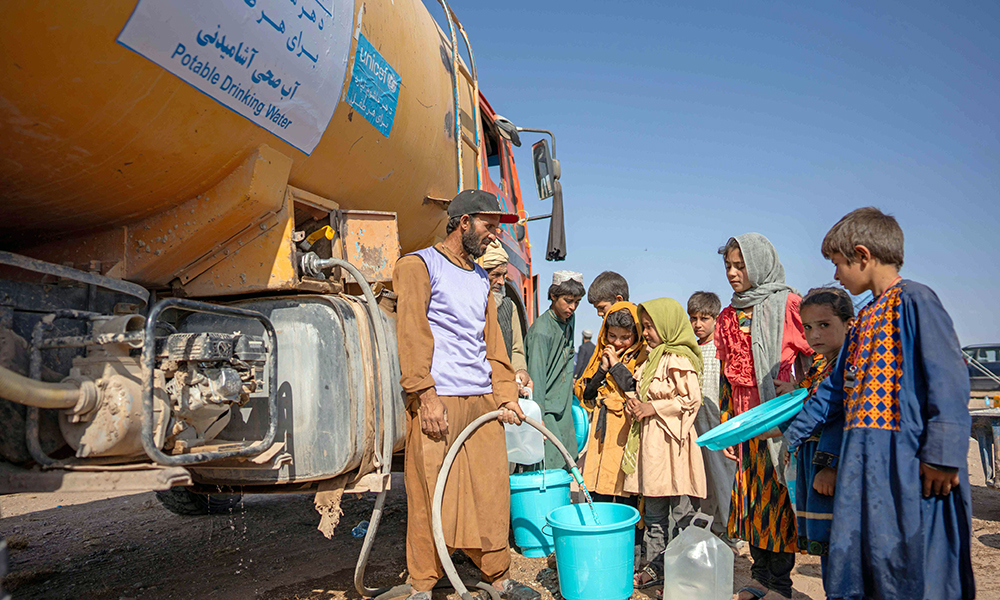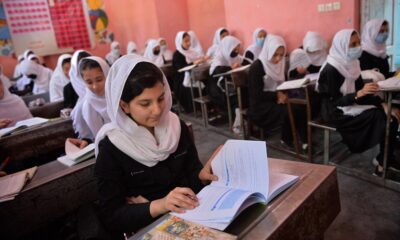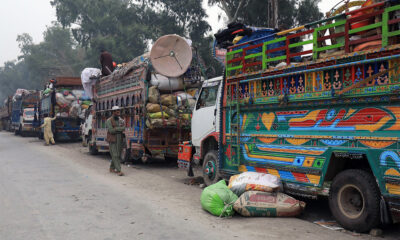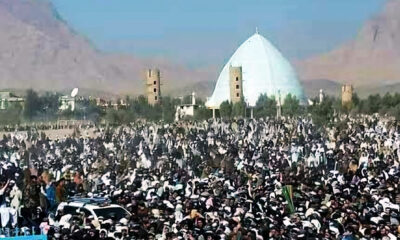Climate Change
India searches for 23 missing soldiers after intense rain and flash flood

The Indian army said Wednesday that 23 soldiers were missing after a powerful flash flood caused by intense rainfall tore through a remote valley in the mountainous northeast Sikkim state.
A video released by an Indian army spokesman showed a thick torrent of raging brown water sweeping down a thickly forested valley, with roads washed away and power lines ripped down.
“Due to sudden cloud burst over Lhonak Lake in North Sikkim, a flash flood occurred in the Teesta River… 23 personnel have been reported missing and some vehicles are reported submerged under the slush,” the army said in a statement. “Search operations are underway.”
The area is close to India’s border with Nepal and China and boasts a sizeable military presence. Lhonak Lake sits at the base of a glacier in the snowy peaks that surround Kangchenjunga, the world’s third-highest mountain, AFP reported.
The army said water released upstream from the Chungthang dam meant the river was already more than 4.5 meters higher than usual.
India has been wary of its northern neighbor’s growing military assertiveness and their 3,500-kilometer shared frontier has been a perennial source of tension, with parts of Sikkim claimed by Beijing.
Clashes in January 2021 left injuries on both sides in Naku La pass, which connects Sikkim with Tibet on the Chinese side, AFP reported.
China and India, who fought a border war in 1962, have posted tens of thousands of troops into border zones.
Flash floods are common during the monsoon season, which begins in June and normally withdraws from the Indian subcontinent by the end of September. By October, the heaviest of the monsoon rains are usually over.
Experts say climate change is increasing their frequency and severity.
Streets swamped
Other photographs shared by the army showed water submerging the first floor of buildings, and flowing down a street in a town with only the tip of a small construction crane visible poking out.
Sikkim Chief Minister Prem Singh Tamang said emergency services were working to support those impacted by the ferocious floods.
“I humbly urge all our citizens to remain vigilant and refrain from unnecessary travel during this critical time,” he wrote on social media.
In neighboring West Bengal state, people were being evacuated from the districts of Kalimpong, Darjeeling and Jalpaiguri and taken to safer places.
The monsoon occurs when summer heat warms the landmass of the subcontinent, causing the air to rise and suck in cooler Indian Ocean winds, which then produce enormous volumes of rain.
But it also brings destruction every year in the form of landslides and floods.
Melting glaciers add to the volume of water while unregulated construction in flood-prone areas exacerbates the damage.
Himalayan glaciers are melting faster than ever before due to climate change, exposing communities to unpredictable and costly disasters.
Glaciers disappeared 65 percent faster from 2011 to 2020 compared with the previous decade, a report in June by the International Centre for Integrated Mountain Development (ICIMOD) warned.
Based on current emissions trajectories, the glaciers could lose up to 80 percent of their current volume by the end of the century, it said.
Climate Change
UN and ICRC warn of serious water shortage in Afghanistan
The International Committee of the Red Cross in Afghanistan reported that an estimated 33 million people in the country face severe water shortage

The United Nations Human Settlements Programme (UN Habitat) warned this week that 21 million people in Afghanistan are currently facing a serious water crisis and that the country needs major investments in water infrastructure.
Stephanie Loose, the head of the programme, said in a report that major Afghan cities such as Kabul, Kandahar and Herat are also facing a serious shortage of clean drinking water and that groundwater resources in these cities are decreasing significantly.
However, last week, the International Committee of the Red Cross (ICRC) in Afghanistan reported that an estimated 33 million people in the country face severe water shortage.
Marking World Water Day on March 22, the ICRC quoted a Kabul resident Shafiqullah Hamkar of District 5 in Kabul city as saying: “Our borewells have completely dried up because of the minimal snowfall and rainfall over the last few years.
“The sharp decline in groundwater levels has left us no choice but to rely on commercial water tankers for our most basic needs. It is a big challenge for us in the city,” he said.
ICRC said Hamkar represents an estimated 80% of Afghans who are dealing with the severe impact of erratic rainfall patterns, rising temperatures and droughts.
The situation is even worse in rural areas where people often rely on untreated surface water, which leads to the spread of waterborne diseases such as cholera and diarrhea.
“For millions of Afghans, who are already struggling with many challenges and facing a dire humanitarian situation, vital activities such as getting water to drink or cook and providing irrigation for crops are often impossible. This has a devastating impact on people’s health and access to food, and hampers the country’s potential for economic development,” says Martin De Boer, the head of programs for the International Committee of the Red Cross (ICRC) in Afghanistan.
He added that the lack of required infrastructure – including water-supply systems, dams and irrigation networks – further exacerbates the challenges. Responding to the needs of the people, the ICRC plays an important role in supporting communities and assisting authorities to improve and manage water supplies.
Climate Change
Over 500,000 Afghans displaced due to climate disasters in 2024: IOM

More than half a million people in Afghanistan were displaced due to climate disasters in 2024, the International Organization for Migration said in a country report published on Tuesday.
“Nearly 9 million individuals were impacted by climate hazards in the last 12 months, with over 500,000 displaced by floods, drought, and other disasters,” IOM said, AFP reported.
“Roughly three in five of those displaced relocated elsewhere within their province of origin”, with the western Herat and Farah provinces among the hardest hit, it said.
This week, 39 people were killed due to floods, hail and storms in southwestern Afghanistan, mainly in Farah, according to local authorities.
Afghanistan is among the poorest countries in the world after decades of war and is ranked the sixth most vulnerable to climate change, which is spurring extreme weather.
Drought, floods, land degradation and declining agricultural productivity are key threats, according to the United Nations.
Flash floods last May killed hundreds and swamped swaths of agricultural land in Afghanistan, where 80 percent of people depend on farming to survive.
“Over 11 million people in Afghanistan are at high risk of severe impacts from climate-induced disasters in the future,” the IOM said.
The UN agency estimates that “climate-sensitive livelihoods, like subsistence farming, make up 73 percent of jobs in Afghanistan”.
It added that “92 percent of villages have limited access to emergency services” and “96 percent lack resources for crucial measures like early warning systems and search and rescue.”
Climate Change
Floods in Farah and Kandahar claim the lives of 29 people

Officials from the disaster management departments of Farah and Kandahar report that floods in these two provinces have resulted in 29 fatalities and nine injuries.
Mohammad Israel Sayar, the head of disaster management in Farah, confirmed to Ariana News that 21 people lost their lives and six others were injured due to floods on Tuesday in the Qala-e-Kah district of the province.
According to Sayar, the victims had gone to the mountains of Qala-e-Kah for recreation purposes when floodwaters suddenly swept them away.
Officials from the disaster management department in Kandahar also stated that floods in the province have caused 11 deaths and injuries.
They reported that in the seventh district of the province, one woman and three children died when the roof of a house collapsed.
They added that in the fifth security district of the province, three women and one child lost their lives due to the floods. Two children and one man were also injured.
-

 World5 days ago
World5 days agoSecretive Chinese network tries to lure fired US federal workers, research shows
-

 Latest News4 days ago
Latest News4 days agoAfghanistan has the right to access Amu River’s water: Uzbek minister
-

 Climate Change5 days ago
Climate Change5 days agoUN and ICRC warn of serious water shortage in Afghanistan
-

 Latest News4 days ago
Latest News4 days agoAmnesty international urges Pakistan to halt Afghan deportations
-

 International Sports5 days ago
International Sports5 days agoIPL 2025: Punjab Kings secure thrilling 11-run win over Gujurat Titans
-

 Latest News4 days ago
Latest News4 days agoUN ‘deeply disappointed’ over ongoing ban on girls’ secondary education
-

 Latest News3 days ago
Latest News3 days agoAfghanistan-Iran-Europe railway corridor activated
-

 Business3 days ago
Business3 days agoAfghanistan ships first consignment to Europe via Khaf-Herat railway
























